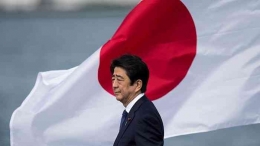He decided to dissolve the lower house and called for snap parliamentary elections, which were held on December 14, 2014. Abe and the LDP won by a large margin, ensuring that he would retain the post of Prime Minister. However, voters showed little enthusiasm for the vote and turned out in very low numbers (Pletcher, 2022).
Following the LDP's strong electoral victory, the Abe administration has actively pursued a revision of Japan's constitution. In 2014 the cabinet had approved a reinterpretation of the constitution's so-called peace clause, which paved the way for passing a bill in May 2015 that would make it easier for Japan to use military force if the country was attacked or threatened.
The bill was subsequently passed by the lower house in July and the upper house in September. Popular opposition to the measures was strong, however, with former Prime Minister, Tomiichi Murayama joining the protesters. The Abe administration has also faced controversy over a proposed new stadium in Tokyo for the 2020 Olympics. The venue design, by architect Zaha Hadid, had initially been accepted but in 2015 was rejected amid fears of ballooning construction costs. Abe's position in the LDP remains strong, however, and in September 2015 he was elected unopposed to another term as party President (Pletcher, 2022).
Although Abe's personal approval ratings have consistently remained below 50 percent since December 2014, the LDP won a landslide victory in the July 2016 election for the upper house of the Diet. The result gave the LDP and New Kmeit a supermajority in both the upper and lower houses, paving the way for constitutional changes that Abe had long advocated. Supporting the LDP was the almost complete collapse of the opposition DPJ, which struggled to present a credible alternative to Abenomics.
A series of scandals in early 2017 pushed Abe's popularity to record lows, but his resurgence in late summer forced him to call snap elections for the lower house in a bid to cement his already formidable majority there. The DPJ, which changed its name to the Democratic Party after merging with the Japan Innovation Party in 2016, effectively elected itself in September 2017. DPJ lawmakers who had planned to contest the October 2017 election were asked to abandon their party affiliation and apply for membership in the Party of Hope, an upstart reform party launched by Tokyo governor and former LDP member Yuriko Koike (Pletcher, 2022).
Pre-election polls put the Party of Hope far behind the incumbent LDP coalition, and Koike further divided the opposition when she introduced a litmus test that excluded liberal candidates. Koike eventually declined to run for a seat in the lower house, and the liberal opposition broke away from the Party of Hope to form the Constitutional Democratic Party.
Abe's political instincts proved correct. Although he remained personally unpopular, the opposition fell apart, and the 2017 election saw the LDP regain a majority lead into both the upper and lower houses of the Diet. Many expected Abe to move forward with his long-promised constitutional revision, but widespread public disapproval led to the measure being postponed indefinitely (Pletcher, 2022).
Abe became Japan's longest-serving prime minister in November 2019, when his tenure surpassed that of Kshaku Katsura Tar, who had served three non-consecutive terms in the early 20th century. In August 2020 Abe announced that he would resign as prime minister due to a recurrence of ulcerative colitis, although he remained in office as caretaker pending the election of his successor. On September 14, 2020, Yoshihide Suga, Abe's chief cabinet secretary, was elected as the new leader of the LDP, and he became prime minister two days later (Pletcher, 2022).
And back in 2013, Shinzo Abe weighed in on security policy, the results of this painstaking and gradual approach can be seen in a number of key areas. These include the establishment of Japan's National Security Council (NSC) in 2013, the passage of a new State Secrecy Law in 2014 and provisions allowing the Japan Self-Defense Forces to participate in collective security operations. There was an increase in Japan's annual defense budget (a 13% increase during Abe's tenure), the development of a more flexible defense doctrine, and the procurement of new military hardware, including F-35 fighters and Izumo-class destroyers capable of enhancing Japan's regional power projection capabilities. Then-Defense Minister Taro Kono spoke ambitiously about the possibility of Japan joining the Five Eyes intelligence partnership between the UK, US, Australia, New Zealand and Canada. This seems to be an indication of how Abe's "pursuit of peace" approach has become the new normal in Japanese foreign policy (Susanti, 2022).
Abe should be credited for his success in maintaining close ties with former US President Donald Trump and using diplomacy as a tool to offset some of the American president's transactional bullying tactics. While Japan remains, like many other US allies, under pressure to increase spending on defense and support for US forces, Abe has avoided a trade war with the US, and the fundamentals of the alliance partnership remain strong. More broadly in terms of foreign policy, Abe has been a diplomatic innovator and demonstrated a capacity for strategic thinking, which marks a sharp change from previous prime ministers, who were often reactive to external events or tended to passively follow Washington's lead. Abe's shift is reflected in a number of new strategic partnerships with India and Australia, defense agreements with Southeast Asian countries, ambitious bilateral foreign and defense partnerships with the UK and France. And the discourse of a new Indo-Pacific vision intended to align economic and security policies with countries spanning the Pacific and Indian Oceans (Susanti, 2022).
Abe's foreign policy innovations were matched by a series of bold multilateral and bilateral trade initiatives, where the prime minister confronted key domestic political constituencies, especially in the agricultural sector. He played a decisive role in strengthening the Trans-Pacific Partnership (TPP-11), securing a trade agreement with the European Union in 2019, which was considered a breakthrough. And negotiated a number of financial and development agreements with China in 2018. Sensibly, while Abe is well aware of the geostrategic threat posed by China, that has not led him to block pragmatic cooperation opportunities with President Xi Jinping. Pragmatism has also underpinned the prime minister's signature "Abenomics" approach to domestic economic management, which allows innovation in the "three arrows" of fiscal, monetary and structural policies (Susanti, 2022).








